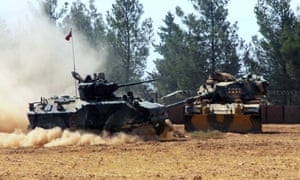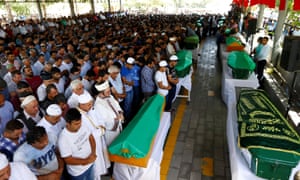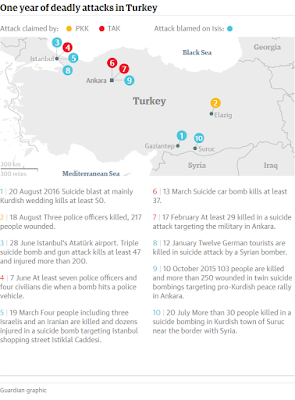Turkey tells border town to evacuate due to skirmish with Isis
Mortar rounds hit town of Karkamış as Turkish army responds with shelling of Islamic State-held border town in Syria

Two tanks in Karkamiș. Photograph: AP
 Martin Chulov-Tuesday 23 August 2016
Martin Chulov-Tuesday 23 August 2016Turkish authorities have ordered residents to evacuate the border town of Karkamış after it was hit by mortar rounds fired from an area of Syria controlled by Islamic State.
The Turkish army responded by firing about 60 artillery shells on positions around Jarablus in Syria, amid preparations by Turkish-backed Syrian rebels to retake the Isis-controlled town.
Turkey announced a major offensive against Isis after a devastating explosion killed 54 people at a wedding in the southern Turkish city of Gaziantep. Turkey’s president, Recep Tayyip Erdoğan, blamed the attack on the extremist group.
While the Turkish moves are likely to increase pressure on Isis in one of its last major redoubts, they are also likely to amplify an ongoing conflict between Ankara and Washington over the direction of the war, in particular whether the priority should be defeating Isis or preserving Syria’s territorial integrity.
Now in the middle of its fifth year, Syria’s civil war took an unexpected turn earlier this month when Syrian Kurds who had been battling Isis turned their guns on forces loyal to Bashar al-Assad in the northern city of Hasakah. The move drew a quick response from Damascus, which sent jets to bomb Kurdish positions and forced Washington to scramble jets to defend its proxies and US special operations forces deployed alongside them.
The development underscores both the complexity and the stakes involved inSyria’s war, which has drawn in the region’s powers, laid much of the country to waste and forced a reshifting of longstanding alliances.
Turkey is furious at Washington’s use of Syrian Kurds as a ground force in an area over which they have claimed de facto autonomy, and has vowed to curtail Kurdish ambitions emerging from the chaos.
“It is more important to them than fighting Isis,” said a western diplomat. “And that has been clear from the outset.


“We have seen that whenever the Syrian Democratic Front [the Kurdish/Arab proxy force] get ahead, the Turks get more energised.”
A recent Turkish detente with Russia, following 10 months of conflict over Moscow’s robust support for the Syrian leader, stemmed from both sides’ belief that maintaining Syria’s current borders was paramount. Ankara agreed to compensate Moscow for shooting down a Russian jet that had entered Turkish air space from Syria last year.
At the same time, Russia ordered the closure of a political office that Syria’s Kurdshad established in Moscow. Over the past week, signs of common ground between Turkey and Syria – antagonists throughout much of the war – have also emerged.
Amid unconfirmed reports that the Turkish intelligence chief, Hakan Fidan, had visited Damascus, Syrian officials pointedly referred to the Syrian Kurdish political organisation, the PYD, as “PKK extremists”. Turkey says there is no difference between the Syrian body and the PKK, with whom it has been fighting for four decades inside its own borders.
Moscow last week sent a delegation to broker a truce between Damascus and the PYD’s military wing, the YPG, but returned without a result. The YPG has said it will not honour earlier agreements with Damascus, which saw both sides stay out of each other’s way for much of the war and over the past 10 months had seen Kurdish forces move into Arab areas of northern Syria under Russian air cover.
Defeating Isis has been the dominant priority for the US, which had until now entered into a tacit non-aggression pact with Damascus, and has been willing to stay out of the way of Russia and Iran as they shore up the struggling Syrian leader.
US officials have told allies in the region that Barack Obama wants one of the two Isis bastions – either Raqqa in Syria, or Mosul in Iraq – to have fallen by the time he leaves office. However, the Kurdish move on Hasakah is a wild card Washington had neither prepared for nor knows how to deal with.
“The Turks will not let this stand,” said an Ankara based western official. “The next few weeks are pivotal.”


